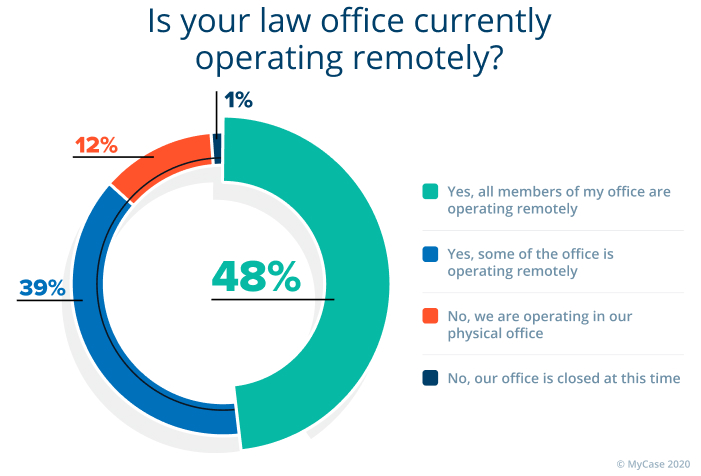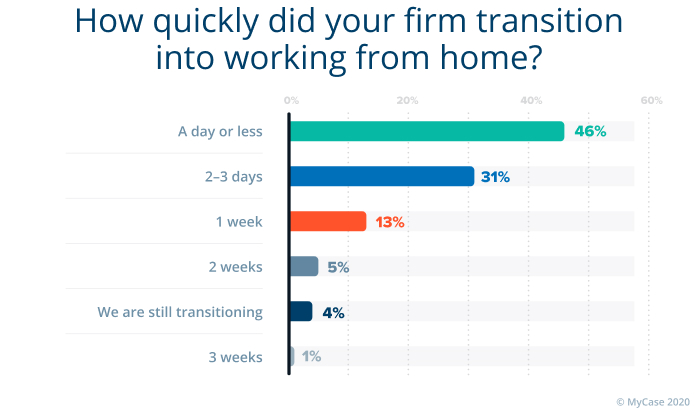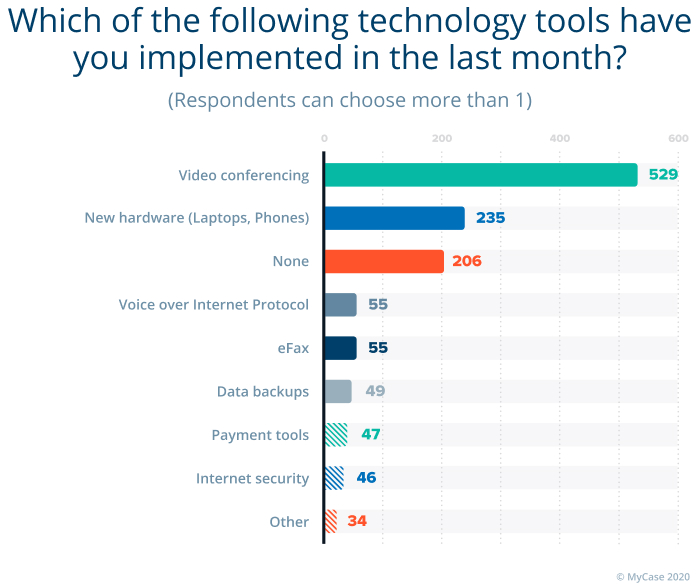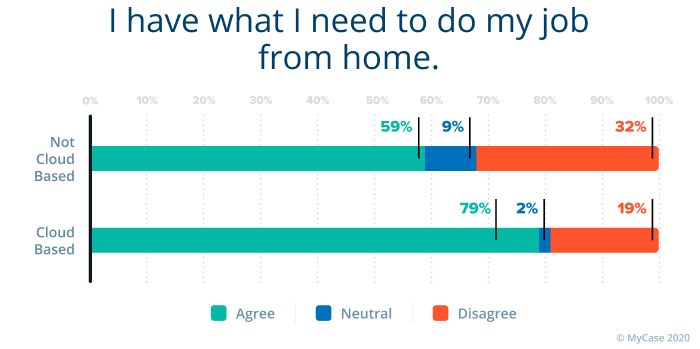[Survey Results] How Law Firms Are Responding to COVID-19 – Remote Work
Editor’s Note: The COVID-19 pandemic has disrupted businesses in ways many of us could not have imagined at the beginning of 2020. MyCase wanted to understand the financial, operational, and individual changes law firms are making to maintain business continuity during this time, so we launched a nationwide survey from April 8th-10th and collected results from 819 legal professionals.
As social distancing guidelines roll across the country, law firms are adjusting by working remotely. In this post, you’ll learn how many firms surveyed have shifted to remote work, how long that transition has taken, and the new tools they’re adopting to maintain operational stability.
The Current State of Law Offices
Based on our findings, over 80% of law firms have transitioned to working remotely. Just over 10% of legal teams remain operational in their physical offices. The high percentage of firms working remotely reflects the impact shelter in place orders are having across the country along with the rising number of federal and state courts suspending trials or closing.
Remote Work Transition Time
Of legal staff surveyed, 75% transitioned to remote work in less than a week. A deeper look reveals that of those firms who transitioned within one week, 60% made the transition inside of one day, suggesting that law offices were either quick to update their technological infrastructure and/or had ample technological resources already in place to initiate a rapid shift.
Technology Adoption
Like many other industries, law firms are heavily adopting new technology in response to COVID-19. A meteoric rise in video conferencing tools among legal professionals surveyed (64%) suggests that firms are rising to the challenge of meeting with clients and staff virtually. Based on our findings, another popular addition to a firm’s technology stack was new hardware (phones, laptops, etc.) with one fourth (25%) surveyed individuals reporting the upgrade. Finally, tech infrastructure updates such as Data backups, eFax, security, Voice Over IP represent the lowest adoption rate from our sampling of data with a varying 5% to 10% each among respondents. The seemingly negligible adoption of such tech suggests that such additions are either lower in priority, already in place, or unfamiliar territory.
Remote Work Preparedness
Though the data above suggests that attorneys are doing their due diligence to make operational shifts in their firms, we pushed in to determine whether or not professionals working remotely feel equipped to execute on their day-to-day duties. Survey results indicate that around 79% of law firm staff using cloud-based systems feel they have what they need to work from home as opposed to only 59% of non-cloud based users sharing that sentiment. This 30% disparity may speak to the advantages of uninhibited remote access to case and billing details in a business setting with minimal face-to-face interaction.
In the wake of COVID-19, the majority of firms we surveyed have made the transition to working remotely and have done so with great urgency — most in under a week. Consequently, technology adoption in the realm of video conferencing has taken precedence for many teams to stay connected with clients and with each other. And though they are in the minority, not all legal professionals feel equipped to work at home, particularly those operating without cloud-based LPMS.
If you are finding that your firm lacks the essential tools you need while working from home, take a look at this webinar, How to Run Your Law Firm Remotely During COVID-19.
—
Thoughts & Advice from Fellow Law Firms
“You need three things: 1) Cloud-based case management/billing solution 2) Legal research solution 3) Communication/production package. Online services like MyCase, MS Office 365 and Lexis provide everything needed at low costs and are easy to scale up and down.”
– Chris Faiella, Gump & Faiella, LLC
“Look to ways to make a permanent transition to cloud-based services and start implementing it now while you may have extra time.”
– Wendy L. Spillane, Law Office of Wendy L. Spillane
“Prioritize! Not everything is an emergency. Make a plan and stick to it.”
– Whitney R. Thomas, Johnny W. Thomas Law Office, P.C.
Take a look at our additional posts on finances and productivity.






